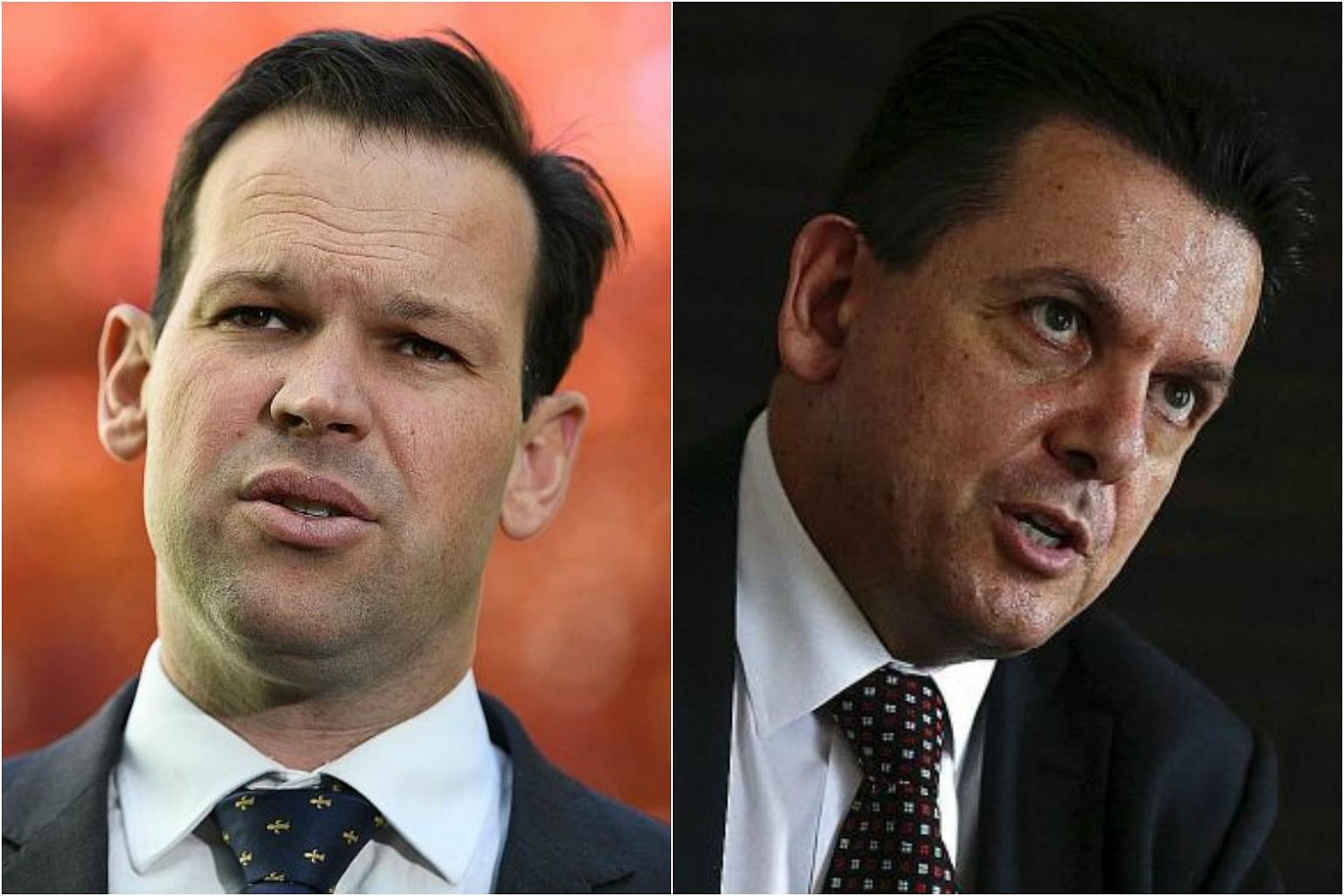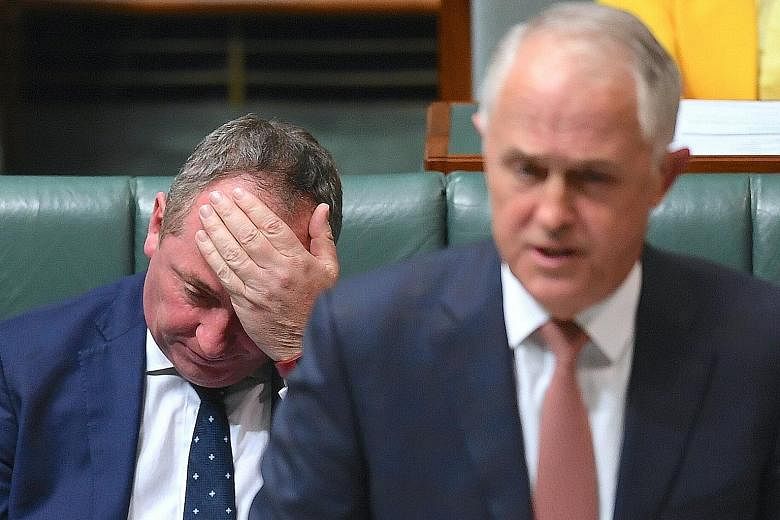Australia's Prime Minister Malcolm Turnbull yesterday lost his one-seat majority in Parliament after the Deputy Prime Minister - and four other legislators - were disqualified by the High Court because they were dual citizens.
In a landmark decision that threw the government into turmoil and rocked the financial markets, the nation's highest court unanimously ruled that Mr Barnaby Joyce, leader of the rural-based National Party, was ineligible to be an MP because he was also a New Zealand citizen.
Describing the court's decision as "disappointing", Mr Turnbull appeared defiant and insisted he will continue to govern with the support of independent legislators.
"The decision of the court today is clearly not the outcome we were hoping for but the business of government goes on," he said.
Mr Joyce has renounced his New Zealand citizenship and will recontest his seat at a by-election on Dec 2. He is expected to win.
In the meantime, the ruling conservative Liberal-National Coalition will have 75 legislators in the 150-member Lower House and will rely on the support of independent MPs. It can also rely on the tie-breaking vote of Speaker of the House Tony Smith, a Liberal.
The court's decision follows an unusual saga in Australian politics in which a growing list of parliamentarians were revealed to be dual citizens and potentially ineligible as legislators.
Section 44 of Australia's Constitution expressly bans parliamentarians from being "a subject or citizen of a foreign power".
Mr Joyce was born in Australia but was deemed a New Zealand citizen because his father was born there. He is a popular MP in his rural electorate of New South Wales.
"I had no reason to believe I was a citizen of any other country but Australia," he said yesterday. "It is a tough game, politics."

-
The case that started it all
-
PERTH • Four months ago, Australian parliamentarian Scott Ludlam called a surprise press conference in Canberra and made a bombshell announcement: he had learnt that he was a New Zealand citizen - as well as being Australian - and was stepping down.
The resignation of the respected Greens senator stunned Canberra, not least because it relied on a section of the Constitution that had, until then, drawn little attention.
Section 44 (i) states that a person cannot become an MP if he or she is "under any acknowledgement of allegiance, obedience, or adherence to a foreign power, or is a subject or a citizen of a foreign power".
Shortly after Mr Ludlam's announcement, his fellow Greens legislator Larissa Waters resigned, saying she had Canadian citizenship, having been born in Canada while her parents were working there. She has not been back to Canada since she was a baby.
Suddenly, legislators from all parties were checking their ancestry and their documentation to ensure they were not dual citizens or that any foreign citizenship had been properly renounced before they became political candidates.
It turned out that seven legislators had serious questions about their status, including Deputy Prime Minister Barnaby Joyce, a New Zealand citizen.
It then fell to the High Court to decide the fate of these seven and to consider whether there was any scope for a liberal interpretation of Section 44 (i). Most legal experts pointed out that the wording of the section was plain: There appeared to be little wriggle room.
The court released its verdict yesterday and ruled unanimously that, indeed, five of the seven were ineligible to sit in Parliament. The broader significance is that candidates in elections will need to take far more care to ensure they are not dual citizens.
Indeed, the two main parties, Liberal and Labor, already seem to be doing so: None of the five legislators had been from these parties, which together contribute the bulk of Australia's 226 federal legislators.
Jonathan Pearlman
Four other legislators were disqualified but - unlike Mr Joyce - they are from the Senate, or Upper House, and will be replaced by colleagues from their parties.
The four are two British citizens, Ms Fiona Nash, a Nationals legislator and government minister, and Mr Malcolm Roberts, from the far-right One Nation party, and Mr Scott Ludlam, a New Zealander, and Ms Larissa Waters, a Canadian, from the Greens party.
The court said two other legislators whose status was also in question - Mr Matt Canavan, a senator from the Liberal-National coalition, and his independent colleague, Mr Nick Xenophon - were validly elected.
The court's long-awaited decision, delivered at 2.15pm in Canberra, was followed by a sudden drop in the stock market. The currency fell by a quarter of a US cent.
The acting leader of the opposition Labor Party, Ms Tanya Plibersek, said Australia now has a hung Parliament and has entered a "period of uncertainty".
She said Mr Turnbull should not have allowed two ministers - Mr Joyce and Ms Nash - to make decisions after learning of their potential ineligibility.
"It is an extraordinary lapse of judgment from the Prime Minister," she said.
Mr Turnbull delayed a trip to Israel to commemorate the 100-year anniversary of the Battle of Beersheba, a campaign during World War I which involved charges by Australian Light Horse units.
With Mr Joyce ejected from Parliament, it remains unclear who will be acting prime minister during Mr Turnbull's absence.
The court said in its decision that it may appear "harsh" to disqualify politicians who were born in Australia and only ever considered themselves to be Australian. But it also said they should have shown "greater diligence" in assessing their foreign citizenship status.
"Nomination for election is manifestly an occasion for serious reflection on this question," the court ruled.
In a welcome development for the government, independent MP Cathy McGowan reaffirmed yesterday that she would stand by her pledge to support the government in crucial no-confidence or budget votes, meaning that it is unlikely to fall.
"I will continue to supply confidence and support to the government," she said.

